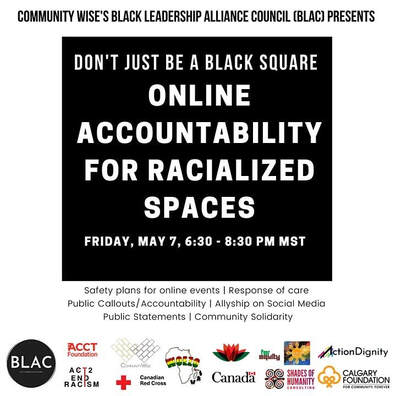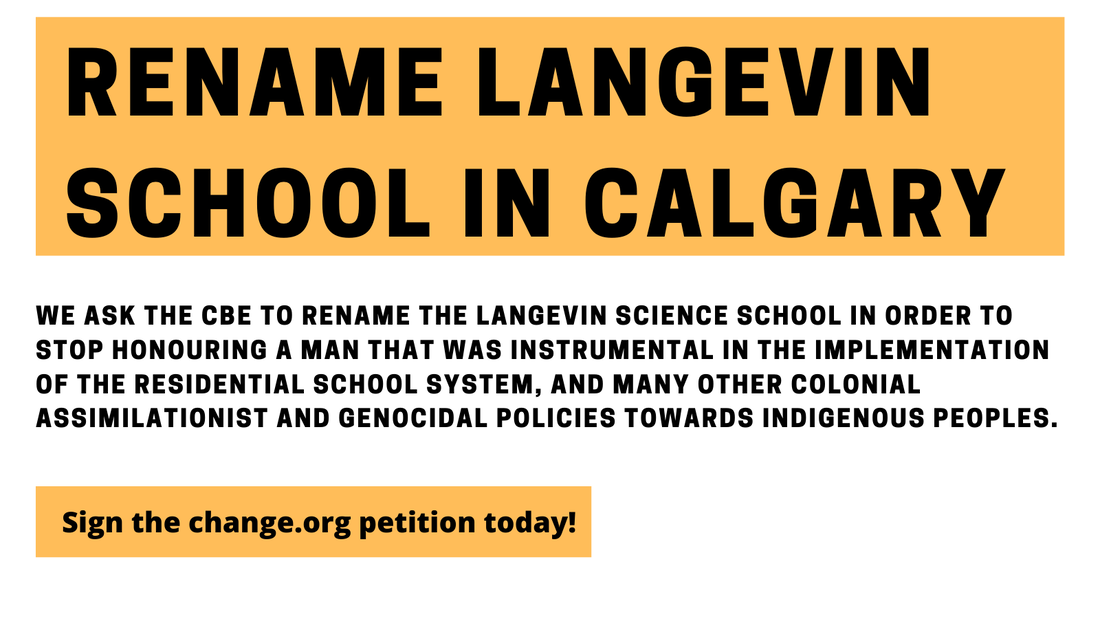Rename the CBE Langevin Science School in order to stop honouring racist colonial policies5/31/2021 Help us promote the good work of the Change Langevin School committee focused on changing the name of the Bridgeland Science School in Calgary from Langevin, the residential school architect.
We are asking the Calgary Board of Education to immediately rename the “Langevin Science School” to the “Bridgeland-Riverside Science School” as a tangible step consistent with the commitment made in 2021 to “advance equity, anti-racism and inclusion” by the CBE CARES committee.[1] As described in existing policy documents, we also ask the CBE to convene a School Naming Committee and select a permanent name for this school consistent with the spirit of Truth and Reconciliation, and to do so in a manner that truly reflects the importance of honourable Nation-to-Nation dialogue. We believe the current name is inappropriate because Hector-Louis Langevin was a vocal proponent of colonial, assimilationist and genocidal policies towards Indigenous peoples. As a cabinet minister he said the following words, which continue to cause harm today: “The fact is if you wish to educate these children you must first separate them from their parents during the time that they are being educated. If you leave them in the family they may know how to read and write, but they still remains savages, whereas by separating them in the way proposed, they acquire the habits and tastes – it is to be hoped only the good tastes – of civilized people.”[2] He did not view Indigenous people as equals, and lead the implementation of racist policies at several levels including the establishment of the first Industrial Schools, the imposition of misogynistic non-traditional Band Council governance styles, and the creation of “Indigenous Status” definitions decided by the colonial government.[2,3] We believe expecting Indigenous students to walk into a school whose name honours a man who did such harm to their people is fundamentally inconsistent with the CBE’s responsibility to “provide safe and positive learning conditions […] that foster a sense of belonging and a respect for diversity”.[4] Honouring Langevin does not support Reconciliation. His name is inextricably linked to decades of intergenerational trauma which continues to affect Indigenous students, families and Canadian society as a whole. Non-Indigenous students are also failed by an educational system that refuses to acknowledge the whole truth of our history. A name change which honours the spirit and content of the Calls to Action contained in the Final Report of the Truth & Reconciliation Commission[5] is necessary to ensure the CBE's core belief that “public education serves the common good”.[6] We note that many distinct governments from across the country have recognized the importance of removing Langevin’s name from various landmarks since at least 2017. Calgary City Council’s chose to re-name the Reconciliation bridge (formerly Langevin bridge).[7] The Office of the Prime Minister changed the name of their offices, which were formerly known as the Langevin Block.[8] Ottawa City Council renamed Langevin road after Algonquin elder William Commanda, who served as Chief of the Kitigan Zibi Anishinabeg First Nation.[9] In this time of Reconciliation, we should be working together in a Nation-to-Nation way. Accordingly, and as required by CBE Governance policy[10], we expect the School Renaming Committee to engage in meaningful, transparent dialogue with all community stakeholders. We ask that Committee membership include representatives of the Niitsitapi Nations (Blackfoot), Tsuut’ina Nation, Nakoda (Stoney) Nations and Métis.
0 Comments
 What does online accountability look and feel like? Go beyond the image and the doom scrolling to consider what it means to be accountable for racialized spaces online. Friday, May 7, we’re presenting another conversation online, that will be looking at just that - online conversations. We’re gathering and hosting online more than ever, the ways in which we treat each other, express ourselves are being seen by the masses. In an effort to build uplifting communities in online spaces for racialized communities are we doing enough? Are we all conscious of what we share, type and say on online spaces - probably not. When we’re not, how do we remain accountable and authentic to the racialized voices we’re trying to uplift. This conversation is for organizations, individuals, allies and anyone who is interested in curating an authentic online presence that demonstrates your actions towards racial equity. The conversation will be looking at various platforms, mediums and action or inaction where we can take better care of one another online. Topics of discussion:
The topics for discussion will help participants learn what accountability can feel like, create a community of care and how to centre the needs of racialized communities. Join us as we navigate the online space together and identify how we can become more accountable to make the change offline! Panelists:
This event will be hosted by CommunityWise on Facebook Live and will be accessible by email for participants the afternoon of May 7, 2021. BLAC wants to give an applause to those who are partnering with us for the conversation: Woezo Africa, bahaghari, Canadian Cultural Mosaic Foundation, CommunityWise, Calgary Foundation, ActionDignity, ACCT Foundation, Act2ENDRacism, Canadian Red Cross, Shades of Humanity, forEquity |
Archives
January 2024
|

 RSS Feed
RSS Feed
